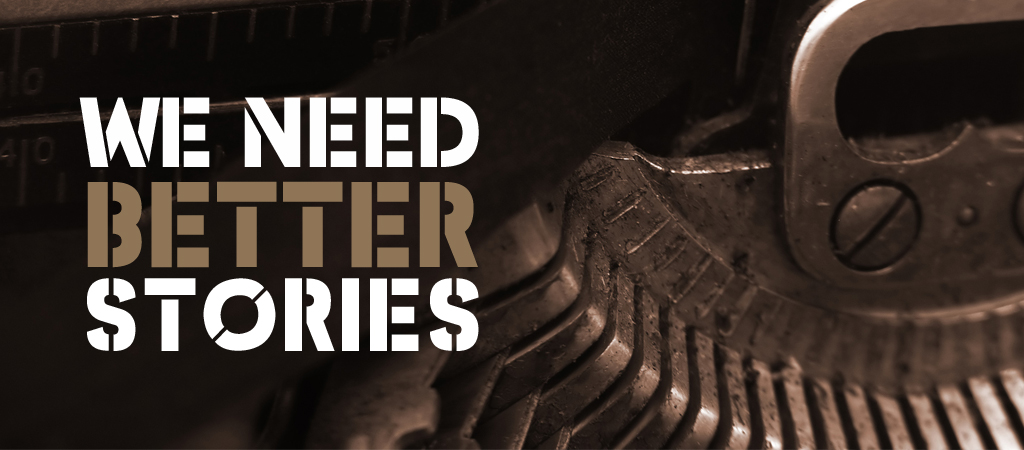The Science Of Why Storytelling Is So Powerful
Stories are powerful. They draw us in and they make us feel.
The experience of hearing or watching a story is processed in our brains differently than when we simply are given facts.
When we hear facts or read information, it hits our “language processing” parts of the brain where we decode words into meaning. And that’s it. Nothing special happens.
But when we hear a story, something very different happens. Not only are the language processing parts of the brain activated, but also the parts of our brain that we would use if we were actually experiencing the events of the story ourselves.
A good story can put your whole brain to work.
I remember some particularly memorable stories from my growing up years in the ‘70’s and ‘80’s…
Rocky
The Karate Kid
The Princess Bride
These stories had an immediate impact on me – I wanted to go lift weights after seeing Rocky, wanted to “crane kick” someone after seeing The Karate Kid, and wanted to fall in love after seeing The Princess Bride.
These stories also influenced and shaped my beliefs.
Rocky made me believe in the power of not giving up (especially on myself).
The Karate Kid made me believe in the power of listening to the instructions of a wise master.
The Princess Bride made me believe in the power of true love.
Even companies understand that stories are better than flat information. In Apple’s TV commercials advertising the FaceTime feature on the iPhone, there are no bullet points or technical facts given. Instead, they tell little stories visually…

A friend of mine commented on yesterday’s post:
“I enjoy stories with that human element—that can make me realize the similarities between myself and the characters… I also like when a story can elicit an emotional response. And regardless of the subject matter, I love when a story accomplishes the thing which Maya Angelou describes aiming for in her writing, ‘The idea is to write it so that people hear it and it slides through the brain and goes straight to the heart.’ Really love that!”
Good stories do that – they slide through the brain and go straight to the heart.
I think Jesus knew the power of storytelling.
“With many stories like these, he presented his message to them, fitting the stories to their experience and maturity. He was never without a story when he spoke.” —Mark 4.33-34 MSG
Wrapping up, I’d like to share a few suggestions from Leo Widrich on using stories:
1. Exchange giving suggestions for telling stories. According to Princeton researcher Uri Hasson, a story is the only way to activate parts of the brain so that a listener turns the story into their own idea and experience.
2. Write more persuasively – include stories from your own life and from others too.
3. The simple story is more successful than the complicated one. The truth is, the simpler a story, the more likely it will stick.
JOIN THE DISCUSSION
What stories have shaped your beliefs? How are you using stories to communicate with others?
This is part 2 of a 3-part series on Better Stories. Check out yesterday’s “Stories With Mischief and Little Bits of Trouble,” and come back tomorrow for “The Danger of a Single Story.”


I LOVE to read. Mostly I read books that grow me in some facet of my life i.e.: spiritual, emotional, business, physical, etc. BUT I learned long ago that there is power in novels. I have about a 1:3 ratio of novels vs. “self growth” books.
I do this because I need a story. I need a hero. I need the man in the shadows to rip through his self persecution and win.
On the flip side, there are a lot of “self growth” books that I finish reading only because I started reading them (years ago I made myself a promise to finish all the books I started). The reason? They are terribly written. Sure they might be chalked full of wisdom and insight that would be mind blowing if it sank in but it doesn’t.
Authors can have brilliant insight on a particular topic but if they’re writing sucks, their book will suck. I’ve seen this addressed recently in some books by authors writing a whole chapter and then slamming a small story at the end to try and make their point. This doesn’t work either because I will be reading on autopilot by the end of the chapter.
If you are a writer, just tell stories. People will learn way more from you if you do.
Nicely said Robb- I never read fiction. But after Brian’s post and your encouragement, I might need to find a good story.